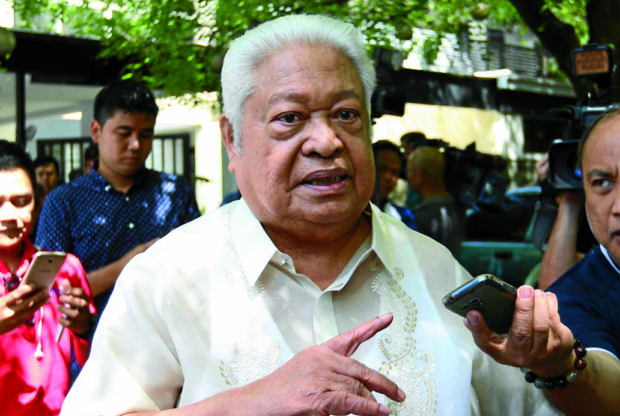Opposition lawmakers ask SC to rescind martial law declaration
Seven opposition lawmakers on Monday petitioned the Supreme Court to rescind President Duterte’s declaration of martial law in Mindanao, arguing that it was based on “patent falsities” and was unconstitutional.
Led by Albay Rep. Edcel Lagman, the group went to the high tribunal after a failed effort last week to convene a joint session of the House of Representatives and the Senate to review Mr. Duterte’s imposition of military rule and the suspension of the privilege of the writ of habeas corpus in Marawi City on May 23 following an attack by Maute group gunmen.
The effort came a day after the Indonesian defense minister said 1,200 Islamic State (IS) operatives were in the Philippines—a statement that the country’s officials said was unconfirmed.
“The President’s proclamation of martial law in Mindanao has no sufficient factual basis as it is feebly based on mostly contrived and/or inaccurate facts, self-serving speculations, enumeration of distant occurrences and mere conclusions of fact and law,” read a portion of the 28-page petition.
‘Magnificent Seven’
Besides Lagman, Ifugao Rep. Teddy Baguilat, Caloocan City Rep. Edgar Erice, Northern Samar Rep. Raul Daza, Akbayan Rep. Tom Villarin, Magdalo Rep. Gary Alejano and Capiz Rep. Emmanuel Billones signed the petition.
Article continues after this advertisementThe petitioners call themselves the “Magnificent Seven.”
Article continues after this advertisementNamed respondents were Executive Secretary Salvador Medialdea, Defense Secretary Delfin Lorenzana and Gen. Eduardo Año, Armed Forces of the Philippines chief of staff.
Under Section 18, Article VII of the 1987 Constitution, the 15-member court is mandated to resolve the petition within 30 days.
The group stressed that the constitutional requirements for the proclamation had not been met, among them the existence of rebellion or invasion in any part of the country.
They said the violence perpetrated by the local terrorists could not be considered a crime of rebellion under the Revised Penal Code.
The petitioners said Maute gunmen raising the IS flag in Marawi was not a form of rebellion, but “at most, a cheap propaganda.”
They noted that Justice Secretary Vitaliano Aguirre II himself had told a House briefing that “acts of terrorism do not automatically constitute rebellion.”
In addition, they said Lt. Gen. Salvador Mison Jr., AFP deputy chief of staff, had “unqualifiedly admitted” that the firefight in Marawi was “government-initiated”—triggered by the military operation to arrest Isnilon Hapilon, a dreaded Abu Sayyaf leader who had pledged allegiance to IS.
“There is no revolution or invasion where the public safety requires the declaration of martial law and the suspension of the privilege of the writ of habeas corpus in Marawi City or elsewhere in Mindanao,” they maintained.
“Consequently, it is clear that the armed resistance by the Maute group was not to lay ‘siege’ on Marawi City, but to shield terrorist leaders Hapilon and the Maute brothers,” they added.
The group noted that Mr. Duterte erroneously claimed that the Maute group took control of a local hospital, ransacked a government-owned bank, burned down two schools and beheaded the police chief of Malabang town in Lanao del Sur province.
‘No legal pedigree’
“An unwarranted and baseless conclusion of fact and law has no legal pedigree,” the group said, stressing that military officials did not recommend the imposition and that Mr. Duterte “acted alone.”
Presidential Chief Legal Counsel Salvador Panelo slammed the petition as part of the “baseless, malicious and divisive motive to spread black propaganda against the administration.”
Panelo stressed that the President’s report to Congress showed his actions were based on military intelligence reports.
He shrugged off the petitioners’ claim that no one in the AFP or the defense department had recommended the emergency measure.
“What the Constitution clearly provides is that, as the Commander in Chief of the Armed Forces and as the sole repository of executive powers, the President, not his security advisers or other government officials, has the sole and executive power and discretion to proclaim martial law,” Panelo said in a statement. —WITH A REPORT FROM CHRISTINE O. AVENDAÑO
